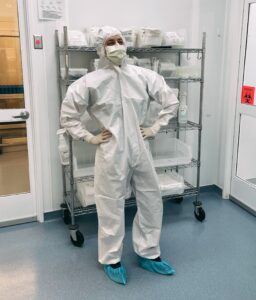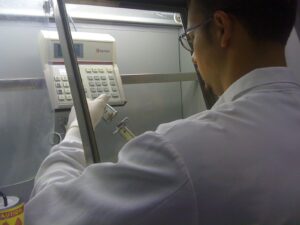View Larger Image
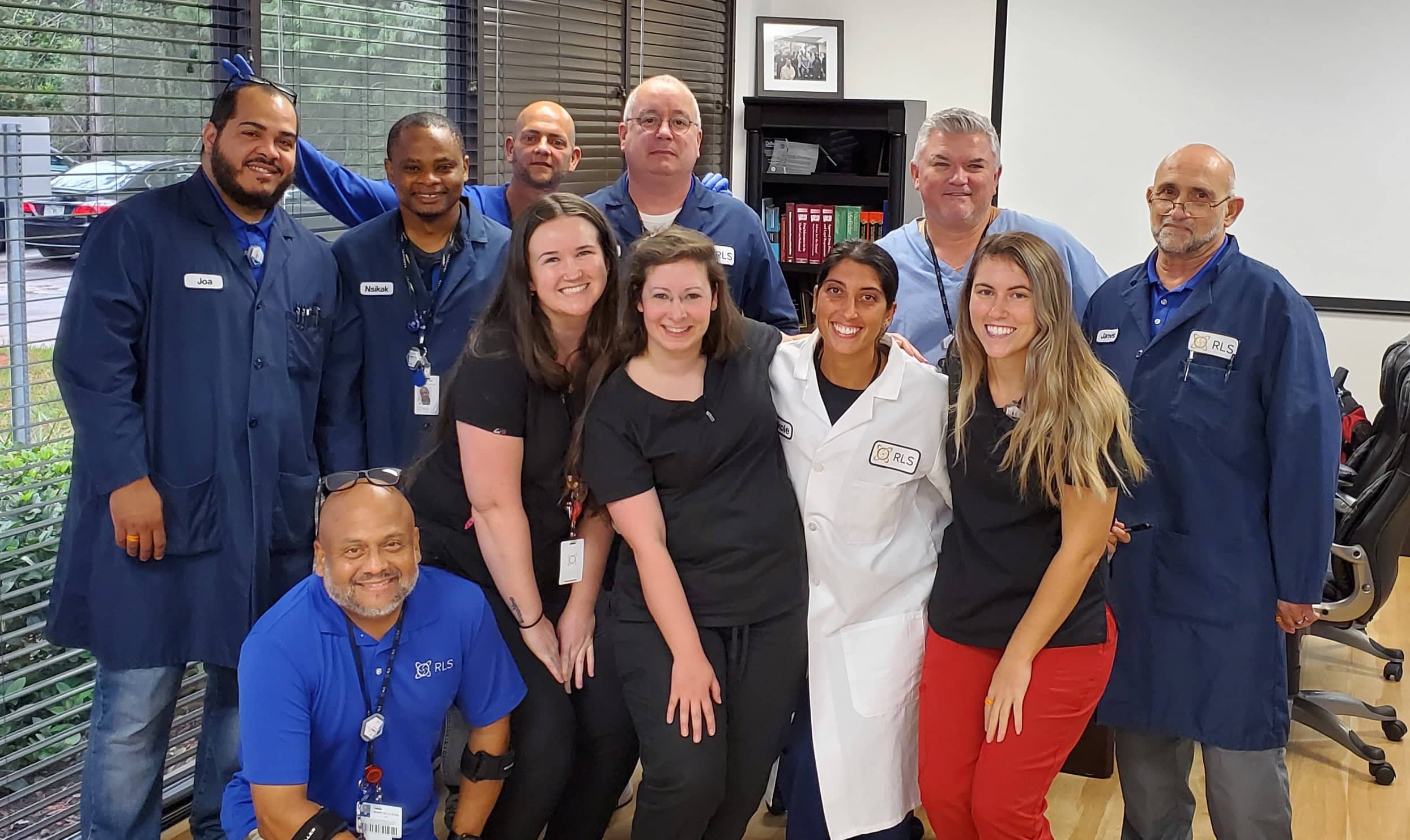
Fatima Al-Doori, Pharm.D. (center, next to white coat) with the nuclear pharmacy team from an internship she served as a College of Pharmacy student. For a small but growing field, networking is crucial.
Image by Fatima Al-Doori
UAMS Nuclear Pharmacy Program Has Strong National Presence
| One of the nation’s leading pharmacy schools, the UAMS College of Pharmacy excels in an area few others do: nuclear pharmacy. UAMS is one of only a handful of nuclear pharmacy programs in the United States that offers the full 200-hour Authorized Nuclear Pharmacy Certificate Program in this specialized field.
Radioactive materials are used in imaging and treatment for thousands of patients across the world, and nuclear pharmacists undergo rigorous training to ensure proper handling of these materials so that radioactive drug products and dosages are prepared correctly and safely. Since radioactive isotopes can have a short half-life, (that is, the amount of time that there is a sufficient amount of the radioactive drug needed for imaging or therapy) nuclear pharmacists are regularly on-call day or night to prepare dosages when they are needed.
The ANP certificate that the College of Pharmacy offers is necessary to become a nuclear pharmacist. This designation is recognized by the Nuclear Regulatory Commission and its Agreement States, which are specially granted authority to license and inspect byproduct, source or special nuclear materials. This certificate is combined with 500 hours of hands-on training in a nuclear pharmacy with radioactive materials to learn proper safety and handling.
“What makes UAMS special is that this coursework is included as an elective for pharmacy students, so they can earn the certificate while they are in pharmacy school,” said Brigette Serfaty, Pharm.D., the program’s director and an associate professor in the Department of Pharmacy Practice. “This makes them highly attractive to nuclear pharmacy employers upon graduation. These students come out of our program ready to go.”
Students hear from nuclear pharmacy industry experts year-round, including employers from large, midsized and independent companies, Serfaty said. There are four nuclear pharmacy employer training sites in Arkansas, which students can visit and do rotations as part of their training. The college also has an active group of nuclear pharmacy students as part of the APhA-ASP student organization, which helps students network with nuclear pharmacy employers to find internships and job opportunities post-graduation.
There have been 359 UAMS graduates who completed ANP training since 1993. Approximately 30% of ANP-certified graduates go on to take a nuclear pharmacy job, with some staying in Arkansas but most accepting jobs out-of-state, Serfaty said. This past May, graduates pursuing nuclear pharmacy careers accepted positions in Massachusetts, Minnesota, Washington and Wisconsin.
“The field is growing again, especially now that there are new molecules [to work with],” Serfaty said. “Instead of just bone scans and heart scans, you can now do scans that are specific to different types of cancer, and target cancers more specifically. The therapeutic side is growing too. That gives not only pharmacists and nuclear medicine techs more options, but patients too.”
Program Offers ‘Substantial Advantage’ for Students
With a growing field and a strong record of job placement, the UAMS nuclear pharmacy program is popular. Both students and graduates tout the learning opportunities as well as the myriad networking opportunities for finding careers in the field.
Fourth-year student Kayla Matlock and Fatima Al-Doori, Pharm.D., COP ’24, each received National Association of Nuclear Pharmacies (NANP) Outstanding Nuclear Pharmacy Student Scholarships over the past year. These scholarships are typically awarded to students who show promise in the field through internships and rotations.
“I did not know about nuclear pharmacy until I started pharmacy school,” Matlock said. “Through our student chapter and the nuclear program offered at UAMS, I have gained interest in this field. I even had the opportunity to experience a summer internship in Denver with Cardinal Health. I am looking forward to my nuclear pharmacy rotations during my fourth year.”
Al-Doori recently accepted a position with the University of Wisconsin Radiopharmaceutical Production Facility in Madison, Wisconsin. She said her fascination with the field began with her first nuclear pharmacy class.
“It was such a specialized and interesting field with a crucial role in diagnosing and treating various medical conditions, including heart, kidney and thyroid diseases, as well as many forms of cancer,” Al-Doori said. “I had the privilege of serving in our student chapter, as well as the unique opportunity to intern with the top three nuclear companies in the United States. These internships offered many job opportunities, and I made meaningful connections and friendships.”
“UAMS stands out as one of the very few colleges of pharmacy that offers a comprehensive nuclear pharmacy educational program,” Al-Doori added. “This distinctive program has provided me with a substantial advantage over my peers nationwide.”
Graduates Find ‘Dream Jobs’ Through Networking
The program helps connect several graduates each year to jobs in the competitive field, whether in Arkansas or elsewhere. Serfaty, who was named the program’s director in 2020, said being a facilitator is one of her most important roles.
“My strength within the program is the relationships that I have within the nuclear pharmacy industry over many decades of practice,” Serfaty said. “Basically, I help connect our students to internships, rotations in- and out-of-state, and to jobs upon graduation. It’s a pretty significant investment of time and energy in helping them to network.”
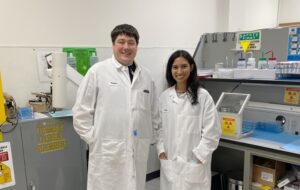
Kent Chamberlain, Pharm.D., COP ’22 and Krupali Gandhi, Pharm.D. COP ’23, shared an internship as pharmacy students.Brigette Serfaty
Being a small, specialized field makes networking even more important.
Krupali Gandhi, Pharm.D., COP ’23, found her dream nuclear pharmacy job in Florida after graduating from the College of Pharmacy. She advised students interested in the field to get involved with the program through SSNP, electives and internships, as well as networking.
“Nuclear is an amazing field, but much different from your traditional routes,” Gandhi said. “It’s okay not to know what your career goals are. Your fourth-year rotations are a great time to figure this out. People always say that nuclear is a small field, and you don’t realize how small until you start networking. Keep an open mind about relocating and be patient. Being honest with recruiters and letting them know your preferences is crucial to finding the best fit.”
Kent Chamberlain, Pharm.D., was class president of the Class of 2022 and was involved in SSNP during his time as a student. He now works at Cardinal Health Nuclear in Shreveport, Louisiana, as a radiation safety officer. In addition to the value of networking in school, he said that students should do “a bit of self-discovery” before job-searching.
“There is no overstating the effect that networking can have,” Chamberlain said. “Talk with your professors, your rotation preceptors, your friends and even strangers in the profession, because who you talk to might land you a job. Before I graduated, three of the four positions I was offered were the direct result of recommendations from pharmacists who knew me in school.”
Self-discovery, Chamberlain said, depends on each person but helps with fit. Even within a highly specialized field, there are a wide variety of jobs and work environments.
“Some people prefer flexibility in their schedule or a high salary, while others prefer a fast-paced environment or a low-stress job,” Chamberlain said. “Each individual has different values, and they are not all mutually exclusive. My current position is not flexible and I spend a lot of time on-call, but I love it for its other values that matter more to me.”
A Nuclear Pharmacy National Hub
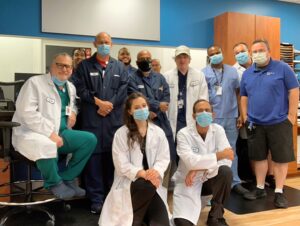
Hannah Johnson (front row at left) with members of her nuclear pharmacy internship in Tampa, Florida.Hannah Johnson
In addition to the immediate benefits for students, the college also collaborates to help train thousands of others in the field each year using its Nuclear Education Online (NEO) program, which began in 2000. The NEO program is part of a consortium with the University of New Mexico College of Pharmacy and offers a variety of training programs within nuclear pharmacy and nuclear medicine.
“These courses provide opportunities for nuclear pharmacy training for other colleges of pharmacy that don’t have a program,” Serfaty said. “We also train physicians who need to become authorized users to handle radioactive materials, many of whom are residents and fellows both inside UAMS and from other institutions.”
The NEO program trains thousands of professionals each year, Serfaty said, including nuclear medicine technologists, nuclear cardiologists, radiologists, oncologists, nuclear pharmacists, nuclear pharmacy technicians and cyclotron workers. It also trains a variety of nuclear pharmacy, nuclear medicine, positron emission tomography (PET) scan, manufacturing and logistics employees in basic radiation safety and shippers and transporters of radiopharmaceuticals.
Through its in-person and online offerings, this makes the College of Pharmacy a national hub for nuclear pharmacy education and certification.
“Between the UAMS nuclear pharmacy program and the Nuclear Education Online program that we run in tandem, we supply a lot of graduates into the nuclear pharmacy industry,” Serfaty said.
As the industry continues to grow, the college will continue to keep pace.
“Drug companies are excited about the growth of nuclear pharmacy, so it won’t be niche forever,” she said. “We’ve been saying that a long time, but now it’s actually happening.”
